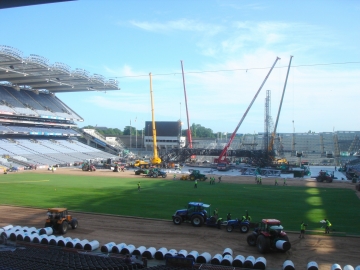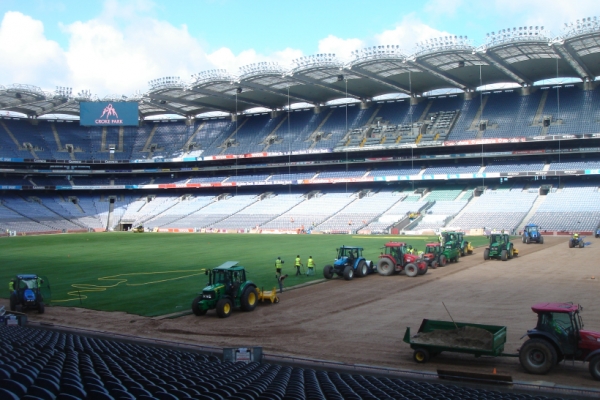Skill & Teamwork pay off as reconstruction of Croke Park Pitch hailed as a success

Realising in June 2009 that the scale of the U2 Concert at the Nou Camp Stadium in Barcelona would mean a complete re-turf at Croke Park following the band’s July 2009 dates there, a specially appointed GAA (Gaelic Athletic Association) Committee and the Sports Turf Research Institute, under the direction of Stadium Director Peter McKenna, set about overseeing the mammoth task of a complete reconstruction of the pitch.
This left a window of just three days for the turf to be installed in readiness for a weekend of five matches just six days after U2’s curtain call.
A pitch replacement had been planned for 2010 to address some historical issues, so the U2 Concerts enabled it to be brought forward.
The size of Croke Park is twice that of a normal football stadium. In normal circumstances, a period of two weeks would be given for the job. It was a formidable task, but the project would be completed under the glare of the media spotlight on them once Dublin City Council had given approval for vehicle movements, hours of work and floodlight use.
Following County Turf’s successful part re-turf of Croke Park’s pitch after Take That’s concert in June, we were once again selected to provide the Sports Greenscape turf, but only after more rigorous testing by the STRI.
The choice of grower proved controversial, with media sources questioning why Irish turf wasn’t selected. Peter McKenna defended the GAA’s decision, explaining that as there weren’t any specialist growers in Ireland, “We looked at a number of farms around the world…but we were very happy with the Scunthorpe product.”
On July 12th, rootzone replacement began ahead of the concerts. Between July 17th and 27th, time was taken up by stage construction and the concert itself.
After final assessments of the turf, harvesting began in Scunthorpe on July 26th. Forty truckloads had already been used in trials during the run-up as transporting such large (1.2m x 10m) rolls in refrigerated lorries is a difficult task – too cold and the turf suffers freezer burn on the edges, too warm and the centres overheat. Both issues cause problems in a ‘lay and play’ scenario. It was therefore imperative that the perfect temperature, load and spacing were used during transportation. DSV Limited was chosen as the haulier and their professionalism ensured the 90 fridge wagons reached Dublin on time. The turf travelled via Liverpool on the Stenna Sea Cat as everyone involved knew how important the cargo was. It even had the best position reserved for it on the boat!
Upon reaching Dublin, the turf was held in a temporary truck park where the temperature of each of the 90 wagons and the inside of each roll was continuously monitored by teams from County Turf and the STRI.
The stability of the turf was jeopardised when, at 1am on July 29th, local residents held a protest for more than twelve hours preventing access to the stadium. The turf had to be held in the wagons and this put it at greater danger of frost damage. When the protest ended, contracting teams from Talbot Farm Landscapes, Clive Richardson Limited and Premier Pitches worked through the night to make up lost time.
The U2 crew were simultaneously dismantling the stage, which meant there were over 400 people on the pitch at one point. Careful organisation of the operation was imperative as any accidents could have brought an abrupt halt to the project.
The pitch laying was completed on July 31st. There then followed two days of final pitch preparations by the Croke Park groundstaff of Rob Ellis, Paddy Walsh and Marcel Bantea to prepare the playing surface. The STRI carried out pitch tests to ensure it performed well in terms of ball bounce, traction, infiltration, hardness and stud penetration.
The first match day on August 2nd brought with it fine weather. The GAA was focussed on the pitch’s performance and they duly got their reward after the first game when managers, players and the press all sung its praises. “Pitch perfect” and “Croker pitch plays a blinder” were just two of the many encouraging headlines that weekend.
Peter McKenna had said before the project began that “we are fully confident that the pitch will be in perfect condition for the start of August and the run-in to the All Ireland Finals.” Thanks to a lot of planning and hard work by all the teams involved, he was proven to be absolutely right.
A video of the job can be viewed on YouTube.


